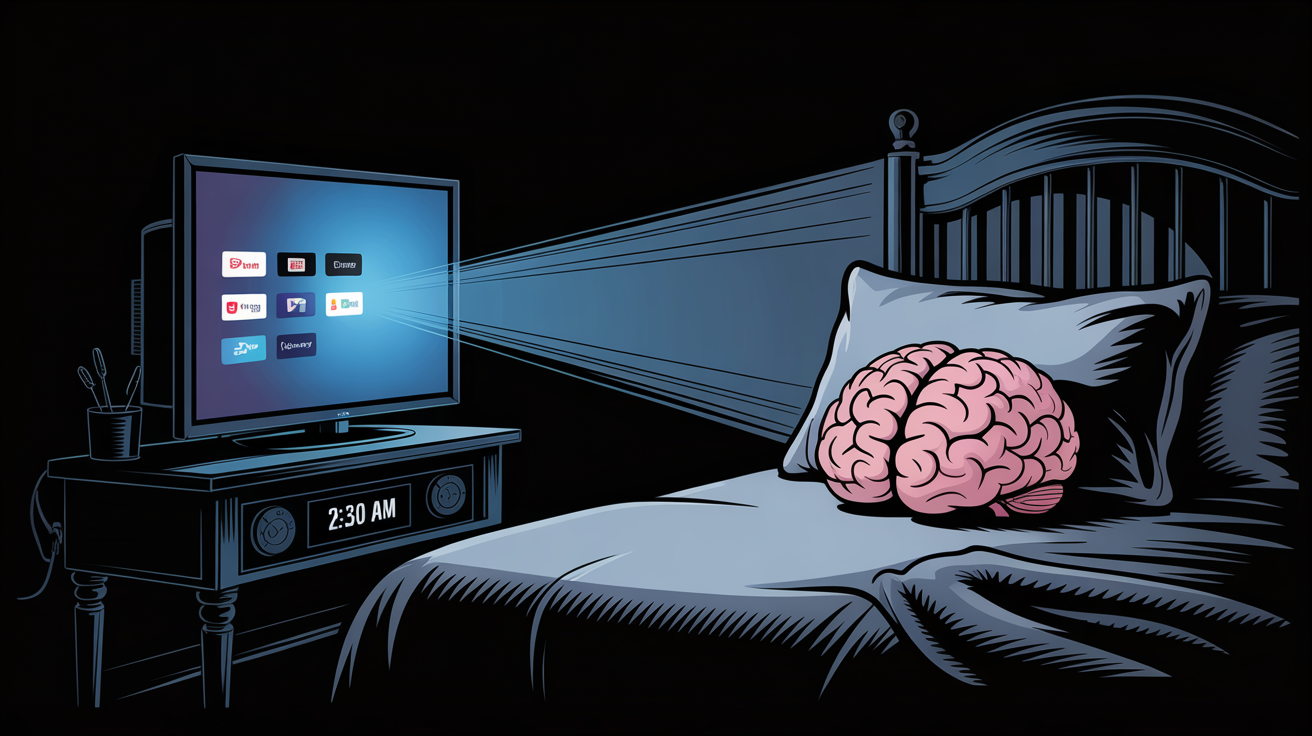How late-night binge-watching sabotages your brain's cleaning cycle

TL;DR
Binge-watching TV shows late at night disrupts critical brain cleaning processes that occur during sleep, potentially impairing next-day decision making, memory, focus and energy levels. According to brain health expert Dr. Daniel Amen, this common habit reduces melatonin production through blue light exposure and creates a cascade of cognitive consequences that extend far beyond just feeling tired.
Why This Matters
The connection between late-night streaming habits and brain health represents a significant but often overlooked aspect of cognitive wellness in our entertainment-saturated world. While most people understand that insufficient sleep affects energy levels, fewer recognize how nightly brain cleaning processes directly impact next-day cognitive function, decision-making quality, and long-term brain health. With streaming services deliberately designing content for binge-watching and social media creating FOMO (fear of missing out) around popular shows, understanding the neurological cost of these habits empowers you to make more conscious entertainment choices that protect your brain's performance capacity.
Key Facts About Sleep and Brain Health
- Sleep deprivation from late-night TV watching impairs next-day decision-making abilities
- During sleep, the brain undergoes crucial "cleaning" processes that cannot be replicated while awake
- Blue light from screens reduces melatonin production, making it harder to fall asleep
- "Just one more episode" mentality often leads to 30-60 minutes of lost sleep
- Prioritizing sleep improves memory, energy, focus and cerebral blood flow
- Blue-light blocking technology can help mitigate some negative effects when used after sunset
What the Science Shows
Dr. Daniel Amen, psychiatrist, brain imaging specialist and founder of Amen Clinics, emphasizes that the brain's nightly maintenance cycle is non-negotiable for cognitive performance.
"When you sleep, your brain cleans and washes itself," explains Dr. Amen, referring to the glymphatic system—the brain's waste clearance mechanism that becomes significantly more active during sleep.
This cleaning process isn't just about feeling refreshed; it's fundamentally tied to cognitive function. Research has established that the brain's ability to remove metabolic waste products during sleep directly impacts next-day performance across multiple domains.
"If you want your memory better tomorrow, go to bed half an hour early tonight," Dr. Amen advises, highlighting the immediate cognitive benefits of prioritizing sleep over entertainment.
The Streaming-Sleep Connection
The rise of streaming services has created new challenges for sleep hygiene. Shows like "Love Island" that air nightly create social pressure to stay current with episodes, leading to what sleep researchers call "revenge bedtime procrastination"—delaying sleep despite knowing the negative consequences.
Dr. Amen cautions against making important decisions after a night of reduced sleep: "Don't make important decisions the next day, because your brain has not been properly 'washed.' And you're just more likely to make a bad decision."
This warning aligns with neuroimaging research showing that sleep deprivation impairs activity in the prefrontal cortex—the brain region responsible for executive function, judgment, and impulse control.
The Blue Light Factor
Beyond just stealing time from sleep, evening screen exposure creates a physiological barrier to quality rest.
"Exposure to screens and blue light before bed decreases the production of melatonin, leaving you less sleepy," Dr. Amen explains. Melatonin, often called the sleep hormone, regulates the body's sleep-wake cycle. When its production is suppressed by blue light, the natural transition to sleep becomes more difficult.
Additionally, "Mindlessly scrolling – you're going to have the fear of missing out almost immediately, which also increases stress," notes Dr. Amen, pointing to how digital content creates a stress response that further interferes with sleep quality.
What You Can Do
-
Reframe your relationship with entertainment: Dr. Amen suggests adopting a mindset focused on what you gain from good sleep rather than what you're missing in entertainment. Ask yourself: "How much do you love yourself? Because doing the right thing is never about deprivation."
-
Use technology strategically: Record shows or save streaming content for the next day rather than extending bedtime.
-
Implement blue light protection: Dr. Amen recommends adding blue-light blockers to all devices that automatically activate at sunset. These can include:
- Blue light filtering apps on devices
- Blue light blocking glasses for evening use
- Screen filters for computers and mobile devices
-
Create a sleep-promoting evening routine: Establish a wind-down period without screens at least 30-60 minutes before bedtime.
-
Prioritize brain health: As Dr. Amen encourages, focus on the abundance of benefits from proper sleep: "I want energy. I want memory. I want focus. I want passion. I want purpose. I want blood flow. I never want to do anything that hurts [the brain]."
Practical Applications
For those who still want to enjoy their favorite shows without compromising brain health:
- Set episode limits: Decide in advance how many episodes you'll watch and stick to it
- Use streaming service timers: Many platforms now offer features that ask if you're still watching after a certain period
- Schedule "catch-up days": Designate specific days for catching up on shows rather than extending every night
- Create a sleep-first entertainment budget: Determine your ideal sleep schedule, then plan entertainment around it—not vice versa
The Bottom Line
The decision to watch "just one more episode" carries cognitive consequences that extend beyond feeling tired the next day. By understanding how late-night streaming impacts brain cleaning processes, melatonin production, and next-day decision-making, you can make more informed choices about your entertainment habits. Prioritizing sleep isn't about deprivation—it's an investment in your brain's performance capacity, providing immediate returns in memory, focus, energy, and decision quality. The next time you're tempted by that cliffhanger ending, remember that your brain's nightly maintenance cycle is the one show you can't afford to miss.



